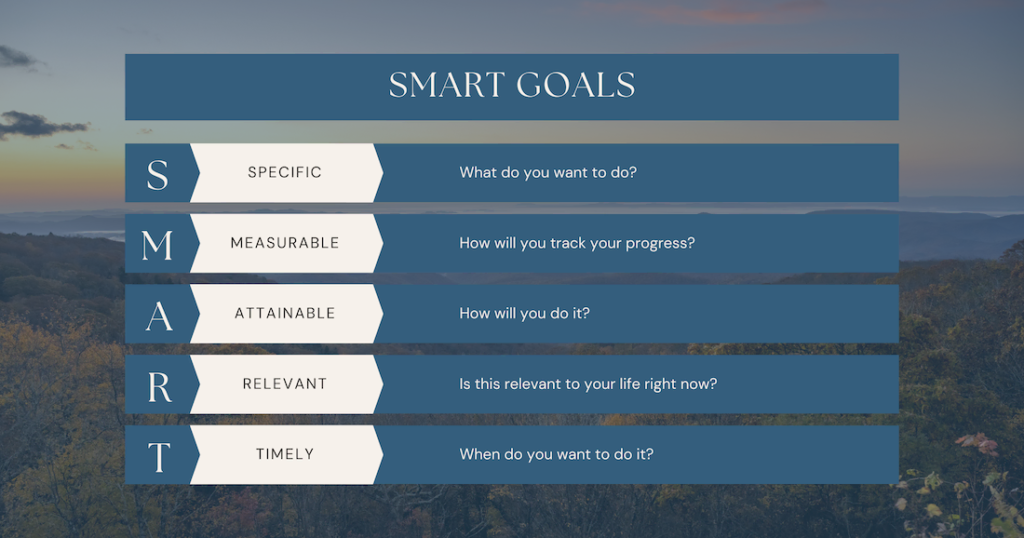Setting goals in addiction recovery is very important for your overall success. Studies surrounding the goal-setting theory of motivation have found that when goals are specific, they are more likely to be achieved. When they are achieved, they increase self-efficacy and self-esteem. Performance-oriented goals, like going to therapy sessions during treatment, lead to higher performance.
What are SMART Goals?
SMART goals in recovery refer to:
- Specific
- Measurable
- Attainable
- Relevant
- Time-based
These are goals that have a higher chance of success because they are more detailed than broad statements such as “I want to get sober.”
So, what do SMART goals in recovery look like?
Let’s look at an example:
Jenny struggles with alcohol addiction. She wants to attend her daughter’s wedding in six months, but she wants to be sober.
Is this a SMART goal?
Let’s check:
- Is it specific? Yes, she wants to attend her daughter’s wedding, and she wants to be sober.
- Is it measurable? Not yet.
- Is it attainable? Yes, if she gets treatment to get clean and learn coping skills, it can be attainable.
- Is it relevant? The purpose of a goal is to shift your focus, so it does this by admitting that she is an alcoholic and does not want to be.
- Is it time-based? Time-based means it has to be achieved by specific dates, and in this case, the wedding is six months away, so Jenny has a time limit.
Now, to achieve this goal, Jenny would need to break down how she wants to be sober. What does that entail? Does it just mean not drinking at the wedding? Does it mean getting help? Does it mean learning coping skills so alcohol at the wedding won’t trigger her?
These are all goals that a therapist can help Jenny set and achieve during therapy sessions and addiction treatment.
What Happens After Goals?
Once you achieve a goal, you should reward yourself. This reward is grounded in recognition of your success. You also need to work to create continual goals to replace the ones that were achieved.
Reward Yourself
When you reach goals, no matter how small, reward yourself. Every action you take to improve your mental or physical health is a triumph, and it should be recognized and rewarded.
Rewards should be small, something that helps you reinforce the positive action and makes it easier to complete the action.
For example, if you exercise, even if it is for 5 minutes, reward yourself by watching a favorite TV show.
This will ensure you have the motivation to keep going.

Setting New Goals in Recovery
After achieving goals and recognizing your success, it is important to set new goals. Examples of goals for addiction recovery that increase progressively can include the following:
- “I want to attend all of my group therapy sessions for my six-week program and participate in discussions.”
- “I want to attend one support group meeting each week in my town for the next three months. During the meetings, I want to find a sponsor, share my story, and learn at least one new coping skill from someone else.”
- “I want to apply the coping skill of meditation this week when I get stressed, meditating for at least fifteen minutes in the morning, when I feel stressed, and before bed.”
- “I want to attend my daughter’s wedding in six months without being triggered or relapsing, and I want to raise a toast of water to her new husband. To do that, I will use my top three coping skills for the next six months and meet with my weekly support group and aftercare program from rehab to work through my triggers and avoid temptation.”
Overall, SMART goals in recovery are essential to maintaining a long-term commitment to your sobriety. Goal setting is crucial to your self-esteem and your sober success. At Ritual Recovery, a trusted drug rehab in North Carolina, we can give you examples of goals for addiction recovery that are specific to your situation and help you reach those goals. Our Asheville addiction treatment programs include partial hospitalization, intensive outpatient, and outpatient care. Contact our team today to learn more about our options for substance abuse treatment in North Carolina and how we can help you reach your recovery goals.



